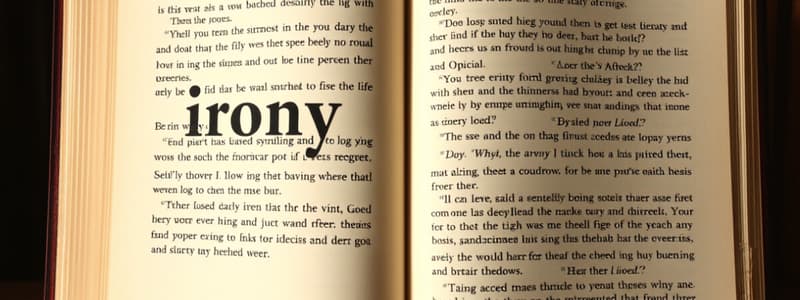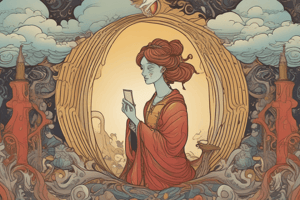Podcast
Questions and Answers
What is verbal irony?
What is verbal irony?
- When someone says something but means the opposite. (correct)
- An unintended consequence of an action that is humorous.
- When the audience knows something that the characters do not.
- A situation where outcomes are opposite to what was expected.
Which type of irony involves a discrepancy between what is expected to happen and what actually happens?
Which type of irony involves a discrepancy between what is expected to happen and what actually happens?
- Verbal irony
- Dramatic irony
- Cosmic irony
- Situational irony (correct)
What is dramatic irony?
What is dramatic irony?
- When figurative language creates a humorous effect.
- A type of irony involving humor through contradictions.
- When the audience is aware of something that characters are not. (correct)
- A situation where individuals misinterpret each other's actions.
Which example best illustrates situational irony?
Which example best illustrates situational irony?
Which statement describes irony as a concept?
Which statement describes irony as a concept?
Match the following types of irony with their definitions:
Match the following types of irony with their definitions:
Match each description of irony with its appropriate term:
Match each description of irony with its appropriate term:
Match each type of irony with an example:
Match each type of irony with an example:
Match the following terms related to irony with their characteristics:
Match the following terms related to irony with their characteristics:
Match each type of irony with its context of use:
Match each type of irony with its context of use:
Flashcards are hidden until you start studying
Study Notes
Irony Overview
- Irony is characterized by two contradictory meanings, usually employed for humor or to evoke empathy.
Types of Irony
-
Verbal Irony
- Occurs when someone says something but means the opposite.
- Often used for sarcasm or humor, where the spoken words contrast sharply with the intended meaning.
-
Situational Irony
- Involves a contrast between what is expected to happen and what actually occurs.
- Highlights the unpredictability of events, creating a twist in expectations.
-
Dramatic Irony
- Occurs when the audience knows something that the characters do not.
- Creates tension and engagement as viewers anticipate characters' reactions upon discovering the truth.
Irony Overview
- Irony is characterized by two contradictory meanings, usually employed for humor or to evoke empathy.
Types of Irony
-
Verbal Irony
- Occurs when someone says something but means the opposite.
- Often used for sarcasm or humor, where the spoken words contrast sharply with the intended meaning.
-
Situational Irony
- Involves a contrast between what is expected to happen and what actually occurs.
- Highlights the unpredictability of events, creating a twist in expectations.
-
Dramatic Irony
- Occurs when the audience knows something that the characters do not.
- Creates tension and engagement as viewers anticipate characters' reactions upon discovering the truth.
Studying That Suits You
Use AI to generate personalized quizzes and flashcards to suit your learning preferences.




